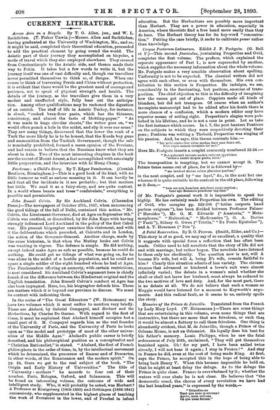John Russell Colvin. By Sir Auckland Colvin. (Clarendon Press.)—The newspapers
of October 27th, 1857, when announcing the good tidings of the fall of Delhi, contained this notice, " Mr. Colvin, the Lieutenant-Governor, died at Agra on September fith." Colvin was credited, or discredited, by Sir John Kaye with having strongly influenced Lord Auckland in the policy of the first Cabul war. His present biographer examines this statement, and with it the deliberations which preceded, at Calcutta and in London, the action of the Governor-General. Another charge, made by the same historian, is that when the Mutiny broke out Colvin was wanting in vigour. The defence is simple. He did nothing, except indeed make Agra as safe as possible, because he could do nothing. He could get no tidings of what was going on, for he was alone in the midst of a hostile population, and he could not spare a single soldier of the eight hundred whom he had at Agra. The Proclamation offering an amnesty, with certain restrictions, is next considered. Sir Auckland Colvin's argument here is chiefly loan& d on the difference between the Hindustani original and the English translation. John Russell Colvin's conduct at Agra has also been impugned. Here, too, his biographer defends him. These are matters which it is beyond our province to discuss. We must be content with indicating them.






































 Previous page
Previous page